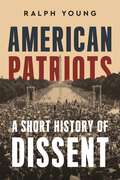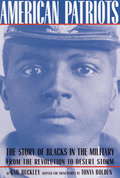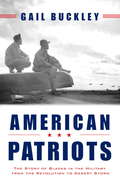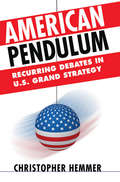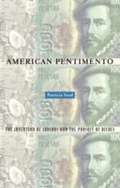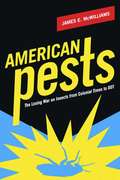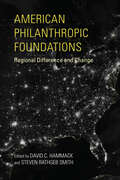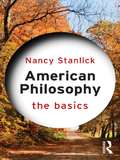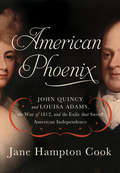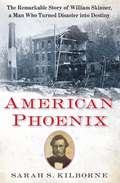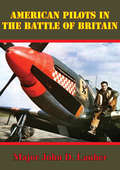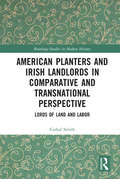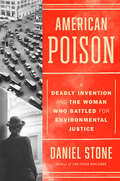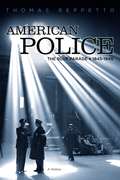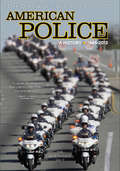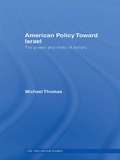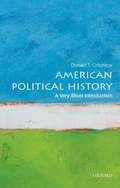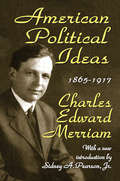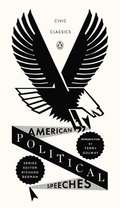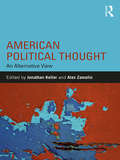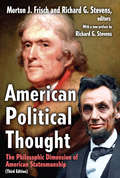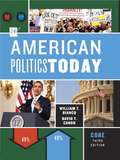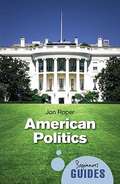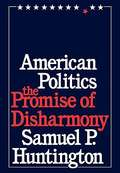- Table View
- List View
American Patriots: A Short History of Dissent
by Ralph YoungA concise history that proves that dissent is patrioticThe history of America is a history of dissent. Protests against the British Parliament’s taxation policies led to the American Revolution and the creation of the United States. At the Constitutional Convention the founders put the right to protest in the First Amendment of the Bill of Rights. In the nineteenth century, dissenters protested against the War of 1812 and the Mexican War, they demanded the abolition of slavery, suffrage for women, and fair treatment for workers. In the twentieth century, millions of Americans participated in the Civil Rights Movement, the antiwar movement, and second-wave feminism. In the twenty-first century, hundreds of thousands protested the war in Iraq, joined the 2011 Occupy movement, the 2017 Women’s March, and the 2020 Black Lives Matter uprisings. The crowds grew larger than ever, but the sentiments expressed were familiar. There have been dissenting Americans for as long as there has been an America.In American Patriots, historian Ralph Young chronicles the key role dissent has played in shaping the United States. He explains that activists are not protesting against America, but pushing the country to live up to its ideals. As he guides the reader through the history of protest, Young considers how ordinary Americans, from moderates to firebrands, responded to injustice. He highlights the work of organizations like SNCC and ACT UP, and he follows iconic individuals like Ida B. Wells-Barnett and Woody Guthrie, charting the impact of their dissent. Some of these protesters are celebrated heroes of American history, while others are ordinary people, frequently overlooked, whose stories show that change is often accomplished through grassroots activism.Yet not all dissent is equal. In 2021, thousands of rioters stormed the US Capitol, and Americans on both sides of the aisle watched the destruction with horror. American Patriots contrasts this attack with the long history of American protest, and challenges us to explore our definition of dissent. Does it express a legitimate grievance or a smokescreen for undermining democracy? What are the limits of dissent? Where does dissent end and sedition begin?In a time when legitimate dissent is framed as unpatriotic, Young reminds us of the dissenters who have shaped our country’s history. American Patriots is a necessary defense of our right to demand better for ourselves, our communities, and our nation.
American Patriots: A Young People's Edition
by Tonya Bolden Gail Lumet BuckleyThey fought on Lexington Green the first morning of the Revolution and survived the bitter cold winter at Valley Forge. They stormed San Juan Hill with Theodore Roosevelt's Rough Riders and manned an anti-aircraft gun at Pearl Harbor. They are the black Americans who fought, often in foreign lands, for freedoms that they did not enjoy at home.Adapted for young readers, this dramatic story brings to life the heroism of people such as Crispus Attucks, Benjamin O. Davis, Charity Adams, and Colin Powell, and captures the spirit that drove these Americans to better their lives and demand of themselves the highest form of sacrifice.From the Hardcover edition.
American Patriots: The Story of Blacks in the Military, from the Revolution to Desert Storm
by Gail BuckleyA dramatic and moving tribute to the military's unsung heroes, American Patriots tells the story of the black servicemen and women who defended American ideals on the battlefield, even as they faced racism in the ranks and segregation on the home front. Through hundreds of original interviews with veterans of every war since World War I, historic accounts, and photographs, Gail Buckley brings these heroes and their struggles to life. We meet Henry O. Flipper, who withstood silent treatment from his classmates to become the first black graduate of West Point in 1877. And World War II infantry medic Bruce M. Wright, who crawled through a minefield to shield a fallen soldier during an attack. Finally, we meet a young soldier in Vietnam, Colin Powell, who rose through the ranks to become, during the Gulf War, the first black chairman of the Joint Chiefs of Staff. Fourteen years in the making, American Patriots is a landmark chronicle of the brave men and women whose courage and determination changed the course of American history.
American Pendulum: Recurring Debates in U.S. Grand Strategy
by Christopher HemmerAs new presidential administrations come into power, they each bring their own approach to foreign policy. No grand strategy, however, is going to be completely novel. New administrations never start with a blank slate, so it is always possible to see similarities between an administration and its predecessors. Conversely, since each administration faces novel problems and operates in a unique context, no foreign policy strategy is going to be an exact replica of its predecessors. In American Pendulum, Christopher Hemmer examines America's grand strategic choices between 1914 and 2014 using four recurring debates in American foreign policy as lenses. First, how should the United States balance the trade-offs between working alone versus working with other states and international organizations? Second, what is the proper place of American values in foreign policy? Third, where does the strategic perimeter of the United States lie? And fourth, is time on the side of the United States or of its enemies? Offering new readings of debates within the Wilson, Truman, Nixon, Bush, and Obama administrations, Hemmer asserts that heated debates, disagreements, and even confusions over U.S. grand strategy are not only normal but also beneficial. He challenges the claim that uncertainties or inconsistences about the nation's role in the world or approach to security issues betray strategic confusion or the absence of a grand strategy. American foreign policy, he states, is most in danger not when debates are at their most pointed but when the weight of opinion crushes dissent. As the United States looks ahead to an increasingly multipolar world with increasing complicated security issues, Hemmer concludes, developing an effective grand strategy requires ongoing contestation and compromises between competing visions and policies.
American Pentimento: The Invention of Indians and the Pursuit of Riches (Public Worlds #7)
by Patricia SeedThe modern regulations and pervading attitudes that control native rights in the Americas may appear unrelated to the European colonial rule, but traces of the colonizers' cultural, religious, and economic agendas remain. Patricia Seed likens this situation to a pentimento - a painting in which traces of older compositions become visible over time -and shows how the exploitation begun centuries ago continues today. Seed examines how the goals of European colonialist in the Americas. The English appropriated land, while the Spanish and Portuguese attempted to eliminate "barbarous" religious behavior and used indigenous labor to take mineral resources. Ultimately, each approach denied native people distinct aspects of their heritage. Seed argues that their differing effects persist, with natives in former English colonies fighting for land rights, while those in former Spanish and Portuguese colonies fight for human dignity.
American Pests: The Losing War on Insects from Colonial Times to DDT
by James McWilliamsThe world of insects is one we only dimly understand. Yet from using arsenic, cobalt, and quicksilver to kill household infiltrators to employing the sophisticated tools of the Orkin Man, Americans have fought to eradicate the "bugs" they have learned to hate. Inspired by the still-revolutionary theories of Rachel Carson's Silent Spring, James E. McWilliams argues for a more harmonious and rational approach to our relationship with insects, one that does not harm our environment and, consequently, ourselves along the way. <P><P>Beginning with the early techniques of colonial farmers and ending with the modern use of chemical insecticides, McWilliams deftly shows how America's war on insects mirrors its continual struggle with nature, economic development, technology, and federal regulation. He reveals a very American paradox: the men and women who settled and developed this country sought to control the environment and achieve certain economic goals; yet their methods of agricultural expansion undermined their efforts and linked them even closer to the inexorable realities of the insect world. As told from the perspective of the often flamboyant actors in the battle against insects, American Pests is a fascinating investigation into the attitudes, policies, and practices that continue to influence our behavior toward insects. Asking us to question, if not abandon, our reckless (and sometimes futile) attempts at insect control, McWilliams convincingly argues that insects, like people, have an inherent right to exist and that in our attempt to rid ourselves of insects, we compromise the balance of nature.
American Philanthropic Foundations: Regional Difference and Change (Philanthropic And Nonprofit Studies)
by David C. Hammack Steven Rathgeb SmithEssays examining the origins, development, and achievements of charitable organizations in key US cities and regions.Once largely confined to the biggest cities in the mid-Atlantic and Great Lakes states, philanthropic foundations now play a significant role in nearly every state. Wide-ranging and incisive, the essays in American Philanthropic Foundations: Regional Difference and Change examine the origins, development, and accomplishments of philanthropic foundations in key cities and regions of the United States. Each contributor assesses foundation efforts to address social and economic inequalities, and to encourage cultural and creative life in their home regions and elsewhere. This fascinating and timely study of contemporary America’s philanthropic foundations vividly illustrates foundations’ commonalities and differences as they strive to address pressing public problems.
American Philosophy: The Basics (The Basics)
by Nancy StanlickAmerican Philosophy: The Basics introduces the history of American thought from early Calvinists to the New England Transcendentalists and from contract theory to contemporary African American philosophy. The key question it asks is: what it is that makes American Philosophy unique? This lively and compelling book moves through key periods in the development of American thought from the founding fathers to the transcendentalists and pragmatists to contemporary social commentators. Readers are introduced to: Some of the most important thinkers in American history including Jonathan Edwards, Thomas Paine, Charles Sanders Pierce, Thomas Kuhn, Cornel West and many more Developments in five key areas of thought: epistemology, metaphysics, religion and ethics, social philosophy, and political philosophy The contributions of American women, African-Americans and Native Americans. Featuring suggestions for further reading and assuming no prior knowledge of philosophy, this is an ideal first introduction for anyone studying or interested in the history of American thought.
American Phoenix
by Jane CookJohn Quincy and Louisa Adams'sunexpected journey that changed everything. American Phoenix is the sweeping, riveting tale of a grand historic adventure acrossforbidding oceans and frozen tundra--from the bustling ports and toweringbirches of Boston to the remote reaches of pre-Soviet Russia, from an exile in arcticSt. Petersburg to resurrection and reunion among the gardens of Paris. Uponthese varied landscapes this Adams and his Eve must find a way to transformtheir banishment into America's salvation.Author,historian, and national media commentator Jane Hampton Cook breathes life intoonce-obscure history, weaving a meticulously researched biographical tapestrythat reads like a gripping novel. With the arc and intrigue of Shakespeareandrama in a Jane Austen era, AmericanPhoenix is a timely yet timeless addition to the recent renaissance ofworks on the founding Adams family, from patriarchs John and Abigail to the second-generationof John Quincy and Louisa and beyond. Cookhas crafted not only a riveting narrative but also an easy-to-understandhistory filled with fly-on-the-wall vignettes from 1812 and its hardscrabble,freedom-hungry people. While unveiling vivid portrayals of each character--acolorful assortment of heroes and villains, patriots and pirates, rogues andrabble-rousers--she paints equally fresh, intimate portraits of both John Quincyand Louisa Adams. Cook artfully reveals John Quincy's devastation after losingthe job of his dreams, battle for America's need to thrive economically, andsojourn to secure his homeland's survival as a sovereign nation. She reservesher most detailed brushstrokes for the inner struggles of Louisa, using thisquietly inspirational woman's own words to amplify her fears, faith, andfortitude along a deeply personal, often heart-rending journey. Cook's close-upperspective shows how this American couple's Russian destination changed USdestiny.
American Phoenix
by Sarah S. KilborneThe incredible story of nineteenth-century millionaire William Skinner, a leading founder of the American silk industry, who lost everything in a devastating flood--and his improbable, inspiring comeback to the pinnacle of the business world In 1845 a young, penniless William Skinner sailed in steerage class on a boat that took him from the slums of London to the United States. Endowed with rare knowledge in the art of dyeing and an uncanny business sense, he acquired work in a fledgling silk mill in Massachusetts, quickly rising to prominence in the nation's new luxury industry. Soon he opened his own factory and began turning out one of the bestselling silk brands in the country. Skinner was lauded as a pioneer in the textile industry and a manufacturer who knew no such word as fail. His business grew to sustain a bustling community filled with men, women, and children, living and working in the mill village of "Skinner-ville," producing the country's most glamorous, fashionable thread. Then, in 1874, disaster struck. Hundreds of millions of gallons of water burst through a nearby dam, destroying everything in its path, including Skinnerville. Within fifteen minutes, Skinner's entire life's work was swept away, and he found himself one of the central figures in the worst industrial disaster the nation had yet known. In this gripping narrative history, Skinner's great-great-granddaughter, Sarah S. Kilborne, tells an inspiring, unforgettable American story--of a town devastated by unimaginable catastrophe; an industry that had no reason to succeed except for the perseverance of a few intrepid entrepreneurs; and a man who had nothing--and everything--to lose as he struggled to rebuild his life a second time. None of Skinner's peers who lost their factories in the Mill River Flood withstood the shock of their losses, but Skinner went on to stage one of the greatest comebacks in the annals of American industry. As a result of his efforts to survive, he became one of the leading silk manufacturers in the world, leaving an indelible imprint on the history of American fashion and style. More striking still, this achievement would never have been possible if Skinner hadn't been ruined by the flood and forced, at age forty-nine, to start all over again, rebuilding everything with just one asset: the knowledge in his head. With masterful skill Kilborne brings to life an era when fabric was fashion, silk was supreme, factories were beacons of American success, and immigrants like Skinner with the secrets of age-old European arts possessed knowledge worth gold to Americans. Here is a story of ambition and desire, resilience and faith, disaster and survival. It is about making it, losing it, and then making it again despite the odds. An enthralling tale, American Phoenix offers a new twist on the American dream, reminding us that just when we thought the dream was over, it may have only just begun. *** FROM AMERICAN PHOENIX As the train slowed in its approach to the depot at the northern end of Skinnerville, one of Skinner's employees, John Ellsworth perhaps, awaited him on the platform. The depot was about a quarter mile from the house along a dark, unlit road. Thus when Skinner stepped down from the car and into the cold night air, he would have found both driver and horse all ready for the short jog home. The trip and this day were almost over, the anniversaries behind him, and a new year in the life of his marriage, his family, and his work was about to begin on the morrow. He was forty-nine years old, and the fabric of his existence had never been stronger. As he walked up the steps to his front door, there in the middle of Skinnerville, with the river flowing reliably behind him, the mill at rest across the way, the houses of his neighbors and employees all around, and a reunion with his wife and children just seconds ahead, there wasn't one clue, nor any sign, that the very next morning nearly everything in his world would be swept away.
American Pilots In The Battle Of Britain
by Major John D. LauherThis study determines the extent of American pilot participation as members of the Royal Air Force, flying in the Battle of Britain. It also examines the recruiting mechanism by which the Americans became involved in the war and documents their contributions as combat pilots during the battle itself.Research reveals that, while many American citizens were recruited to fly for Britain during the summer of 1940, only six Americans are known to have actually participated in the Battle of Britain, fought between 12 August and 15 September 1940. These men not only demonstrated America's determination to support her allies, but materially contributed to Britain's cause by destroying two and one half enemy aircraft, probably destroying five others, and damaging two more during their brief RAF careers.
American Planters and Irish Landlords in Comparative and Transnational Perspective: Lords of Land and Labor (Routledge Studies in Modern History #77)
by Cathal SmithThis is the first study to systematically explore similarities, differences, and connections between the histories of American planters and Irish landlords. The book focuses primarily on the comparative and transnational investigation of an antebellum Mississippi planter named John A. Quitman (1799–1858) and a nineteenth-century Irish landlord named Robert Dillon, Lord Clonbrock (1807–93), examining their economic behaviors, ideologies, labor relations, and political histories. Locating Quitman and Clonbrock firmly within their wider local, national, and international contexts, American Planters and Irish Landlords in Comparative and Transnational Perspective argues that the two men were representative of specific but comparable manifestations of agrarian modernity, paternalism, and conservatism that became common among the landed elites who dominated economy, society, and politics in the antebellum American South and in nineteenth-century Ireland. It also demonstrates that American planters and Irish landlords were connected by myriad direct and indirect transnational links between their societies, including transatlantic intellectual cultures, mutual participation in global capitalism, and the mass migration of people from Ireland to the United States that occurred during the nineteenth century.
American Poison: A Deadly Invention and the Woman Who Battled for Environmental Justice
by Daniel StoneFrom the national bestselling author of The Food Explorer comes the untold story of Alice Hamilton, a trailblazing doctor and public health activist who took on the booming auto industry—and the deadly invention of leaded gasoline, which would poison millions of people across America. At noon on October 27, 1924, a factory worker was admitted to a hospital in New York City, suffering from hallucinations and convulsions. Before breakfast the next day, he was dead. Alice Hamilton was determined to prevent such a tragedy from happening again. By the time of the accident, Hamilton had pioneered the field of industrial medicine in the United States. She specialized in workplace safety years before the Occupational Safety and Health Administration was created. She was the first female professor at Harvard. She spent decades inspecting factories and mines. But this time, she was up against a formidable new foe: America&’s relentless push for progress, regardless of the cost. The 1920s were an exciting decade. Industry was booming. Labor was flourishing. Automobiles were changing roads, cities, and nearly all parts of American life. And one day, an ambitious scientist named Thomas Midgley Jr. triumphantly found just the right chemical to ensure that this boom would continue. His discovery—tetraethyl leaded gasoline—set him up for great wealth and the sort of fame that would land his name in history books. Soon, Hamilton would be on a collision course with Midgley, fighting full force against his invention, which poisoned the air we breathe, the water we drink, and the basic structure of our brains. American Poison is the gripping story of Hamilton&’s unsung battle for a healthy planet—and the ramifications that continue to echo today.
American Police
by Thomas A. ReppettoFrom its beginnings in eighteenth-century London, this is the history of the largest urban police departments in the United States and a social portrait of America during the first century of its existence. From the birth of the New York City Police Department in 1845 to the end of World War II, each city had its share of crime, murders, vice, drug dealers, and addicts.Boston, New York, Chicago, Philadelphia, San Francisco, and Los Angeles each had their own history and developed in different ways according to local realities. But in every case, each police department had to deal with its share of good and bad cops, Pinkertons, gangsters, revolutionists, politicians, reporters, muckrakers, arsonists, murderers, district attorneys, strikers, labor spies, hanging judges, and axe-swinging crusaders, as well as every conceivable element of American society high and low.But American Police also offers a view of the FBI and its legendary director, J. Edgar Hoover; District Attorney Earl Warren and police commissioners such as Teddy Roosevelt, Stephen J. O'Meara, Richard Enright, Grover Whalen, Louis J. Valentine, and August Vollmer; and tough cops like Captain William "Clubber" Williams, Johnny "the Boff" Broderick, and John Cordes.It is also the history of crime over the course of a century that transformed the United States from a former colony of the British Empire to a powerful and restless nation poised for spectacular growth.Thomas A. Reppetto, a former commander of detectives, is the author of NYPD and American Mafia.
American Police, A History: 1945-2012
by Thomas A. ReppettoPostwar America saw few changes to law enforcement in one hundred years. The little known San Francisco riot of August 1945 announced the violent events of the next half century. Most of the methods remained unchanged until the 1953 kidnapping of Bobby Greenlease in Kansas City, Missouri, that shook the country. The 1960s were dominated by civil rights struggles and major riots. Watts, Detroit, and Newark demonstrated how local police departments were unable to handle the disorders that engulfed those cities. The anti-war protest at the 1968 Chicago Democratic Convention is important to this narrative since the author was in charge of convention security. The police department was split on how to deal with the protestors: a major revelation of this book. The author also turned down an offer to become part of a unit later known as the "plumbers" made to him personally by Attorney General John Mitchell. The 1970s and '80s are the lowest points in modern American law enforcement until the emergence of "zero tolerance" by New York Commissioner William Bratton and Mayor Rudy Giuliani. 9/11 changes the landscape with the new focus on counter terror and new challenges to law enforcement. Thomas Reppetto began as a police officer, rising to Commander of Detectives in the Chicago Police Department. In 1970 he received a PhD in public administration from the Harvard School of Government. He taught at the John Jay College of the City University of New York and became dean of graduate studies, then vice president. He is retired and lives in the New York City area.
American Policy Toward Israel: The Power and Limits of Beliefs (LSE International Studies Series)
by Michael ThomasThis book explains the institutionalization of nearly unconditional American support of Israel during the Reagan administration, and its persistence in the first Bush administration in terms of the competition of belief systems in American society and politics. Michael Thomas explains policy changes over time and provides insights into what circumstances might lead to lasting changes in policy. The volume identifies the important domestic, social, religious and political elements that have vied for primacy on policy towards Israel, and using case studies, such as the 1981 AWACS sale and the 1991 loan guarantees, argues that policy debates have been struggles to embed and enforce beliefs about Israel and about Arabs. It also establishes a framework for better understanding the influences and constraints on American policy towards Israel. An epilogue applies the lessons learned to the current Bush administration. American Policy toward Israel will be of interest to students of US foreign policy, Middle Eastern politics and international relations.
American Political Cartoons: From 1754 to 2010
by Sandy NorthropFrom Benjamin Franklin's drawing of the first American political cartoon in 1754 to contemporary cartoonists' blistering attacks on George W. Bush and initial love-affair with Barack Obama, editorial cartoons have been a part of American journalism and politics. American Political Cartoons chronicles the nation's highs and lows in an extensive collection of cartoons that span the entire history of American political cartooning."Good cartoons hit you primitively and emotionally," said cartoonist Doug Marlette. "A cartoon is a frontal attack, a slam dunk, a cluster bomb." Most cartoonists pride themselves on attacking honestly, if ruthlessly. American Political Cartoons recounts many direct hits, recalling the discomfort of the cartoons' targets and the delight of their readers.Through skillful combination of pictures and words, cartoonists galvanize public opinion for or against their subjects. In the process they have revealed truths about us and our democratic system that have been both embarrassing and ennobling. Stephen Hess and Sandy Northrop note that not all cartoonists have worn white hats. Many have perpetuated demeaning ethnic stereotypes, slandered honest politicians, and oversimplified complex issues.
American Political History: A Very Short Introduction
by Donald T. CritchlowThis brief, accessible book explores the nature of the two-party system, key turning points in American political history, representative presidential and congressional elections, struggles to expand the electorate, and critical social protest and third-party movements.
American Political Ideas, 1865-1917
by Charles MerriamCharles Merriam is scarcely read today, and even among scholars he is probably more often cited than read seriously. His ambiguous position in the study of American democracy is unfortunate. Between the two world wars, Merriman was the doyen of American political science. This was a period when the most formative characteristics of academic social sciences were taking shape, characteristics that were to dominate the remainder of the century. During this period, "science" and "progress" became virtually synonymous in the social sciences. Between the two world wars, the liberal progressive critique of America's founders, a critique that included scholars such as Woodrow Wilson, Charles Beard, and others, became the orthodoxy of a new political science. The heart of that critique, insofar as it turned on methodological questions of how to study American government, was very much the work of Charles Merriam. Anyone who seeks to understand why that period was so pivotal in the interpretation of American democracy must necessarily study Charles Merriam and his influence. His work represents the first comprehensive effort by a scholar in the liberal-progressive tradition to survey the entirety of American political thought. To read Merriam's political essays and writings is to read a political theory that the behavioral tradition would come to label as "normative." His essays included insightful interpretations of Hobbes and Rousseau in European political philosophy as well as an earlier work tracing American political thought from the founding to the Civil War. This is a fundamental work for scholars working in the liberal-progressive tradition.
American Political Speeches
by Richard Beeman Terry GolwayA selection of speeches by the most inspiring and persuasive orators in American history Penguin presents a series of six portable, accessible, and--above all--essential reads from American political history, selected by leading scholars. Series editor Richard Beeman, author of The Penguin Guide to the U.S. Constitution, draws together the great texts of American civic life to create a timely and informative mini-library of perennially vital issues. Whether readers are encountering these classic writings for the first time, or brushing up in anticipation of the 50th anniversary of the Civil Rights Act, these slim volumes will serve as a powerful and illuminating resource for scholars, students, and civic-minded citizens. American Political Speeches includes the best American rhetoric from inside and outside the White House. Some of the greatest words spoken in American history have come from men and women who lacked the biggest bully pulpit in the country, but who nevertheless were able to move the nation with words. Frederick Douglass explained the irony of Independence Day from the perspective of a slave. Martin Luther King, Jr. described his dream of an interracial America. William Jennings Bryan gave voice to social discontent with a single phrase, "a cross of gold." Barbara Jordan summoned the nation"s outrage during the impeachment hearings against Richard Nixon. And the best presidents, not by coincidence, have tended to be those with an appreciation for the use of language: Lincoln explaining a new birth of freedom at Gettysburg; John Kennedy voicing moral outrage at the Berlin Wall; Franklin D. Roosevelt chatting to a nation gathered in front of radios; Ronald Reagan addressing Congress freshly healed from an assassination attempt.
American Political Thought: An Alternative View
by Alex Zamalin Jonathan KellerThe twenty-first century presents unique political challenges, like increasing concern over racially based police brutality and mass incarceration, continuing economic and gender inequality, the rise of conservative and libertarian politics, and the appropriate role of religion in American politics. Current scholarship in American political thought research neither adequately responds to the contemporary moment in American politics nor fully captures the depth and scope of this rich tradition. This collection of essays offers an innovative expansion of the American political tradition. By exposing the major ideas and thinkers of the four major yet still underappreciated alternative traditions of American political thought—African American, feminist, radical and conservative—this book challenges the boundaries of American political thinking about such values like freedom, justice, equality, democracy, economy, rights, identity, and the role of the state in American life. These traditions, the various authors show in different ways, not only present a much fuller and more accurate characterization of what counts as American political thought. They are also especially unique for the conceptual resources they provide for addressing contemporary developments in American politics. Offering an original and substantive interpretation of thinkers and movements, American Political Thought will help students understand how to put American political thought into conversation with contemporary debates in political theory.
American Political Thought: The Philosophic Dimension of American Statesmanship
by Richard G. Stevens Morton J. FrischThis book focuses on the political thought of American statesmen. These statesmen have had consistent and comprehensive views of the good of the country and their actions have been informed by those views. The editors argue that political life in America has been punctuated by three great crises in its history the crisis of the Founding, the crisis of the House Divided, and the crisis of the Great Depression.The Second World War was a crisis not just for America but for the whole of Western Civilization and, in the wake of that war, a new crisis arose which came to be called the "Cold War." Just when that gave the appearance of being resolved, the world reached a new juncture, a new crisis, which Samuel P. Huntington dubbed the "clash of civilizations." The statesmen having political responsibility in confronting the first three crises in America's history came as close to philosophic grasp of the problems of liberal democracy as one could demand from those embroiled in the active resolution of events. Their reflection of political philosophy in the full sense informed their actions.Since we cannot confidently explain the future, Aristotle warned us to call no man happy while he still lives. Thus the book, in its third edition, keeps to its settled pattern of dealing with settled matters. The preface to the third edition confronts the three later crises and, to the extent consistent with truth, attempts to relate them to the first three.
American Politics Today 3rd Edition
by David T. Canon William T. BiancoPolitics is about conflict and compromise.<P> American Politics Today helps students understand the debates and controversies that they encounter in the news by emphasizing conflict and compromise as natural parts of politics. New book features--including highly visual "How It Works" infographics--show how the American political process resolves conflicts.
American Politics: A Beginner's Guide (Beginner's Guides)
by Jon RoperThis dynamic Beginner's Guide covers everything you need to know about American politics today. Exploring the principles enshrined in the Declaration of Independence and Constitution, Jon Roper asks whether the politics of personality have become too pervasive in the USA. Tackling the nature of the presidency, American foreign policy, and President Obama's administration, this is a sharp analysis of how history has shaped the way America governs itself today. Including a section on how religion impacts American politics, this is the perfect introduction for anyone interested in the politics of the world's oldest democratic republic. Jon Roper is a professor of American Studies who has taught at the University of Tennessee, the University of Wisconsin, and Ohio State University. He is the author of The Complete Illustrated Guide to the Presidents of America: An Authoritative History of the American Presidency.
American Politics: The Promise of Disharmony
by Samuel P. HuntingtonThis book examines the persistent, radical gap between the promise of American ideals and the performance of American politics. Samuel P. Huntington shows how Americans, throughout their history as a nation, have been united by the democratic creed of liberty, equality, and hostility to authority.
